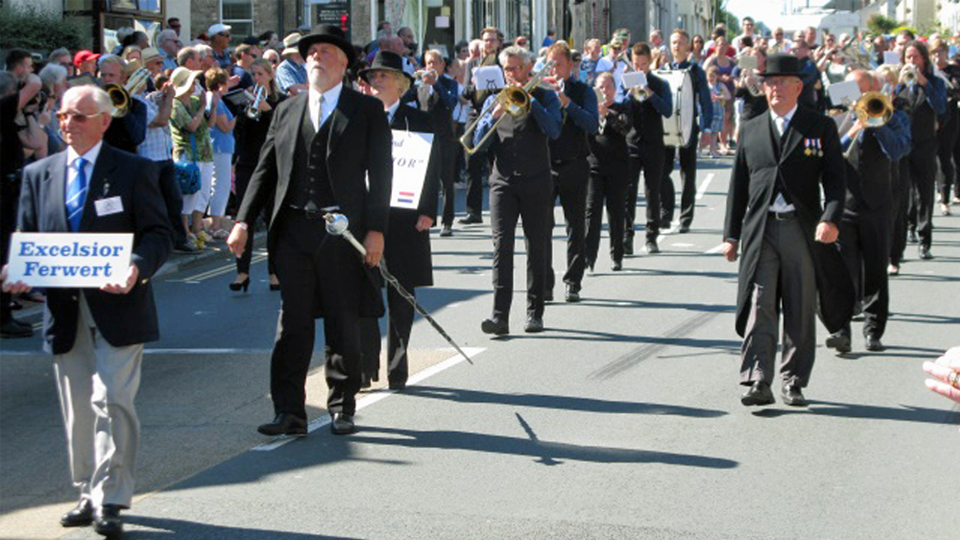
As a follow-up to his earlier article in this series about brass bands (find it here), Tony Mansell looks at the world of contesting where bands compete for the ultimate accolade.
Competitions, or contests as they are termed in the brass band world, have their beginning in the brass and reed band era of the early 1800s. Despite the great variety in the number of players, the instruments played and the sound produced, competition was possible and Phillip Hunt1 cites an informal contest in 1821 when Besses o’ th’ Barn and a number of other bands competed against each other. The bands had been hired to take part in a procession to celebrate the Coronation of King George 4th. Phillip wrote:
“William George, a very prominent leader of bands at that time, in order to while away the time during the marshalling of the people, suggested that each band play a piece of its own selection and that a prize would be awarded to the band judged the best. The winner was Besses, the players resplendent in white cockade hats, scarlet tunics and white trousers. Their test piece was ‘God Save the King’.”
Whether or not this was the first contest we will probably never know but it is certainly one of the candidates for such a claim and it was undoubtedly a model for a great tradition which is still as strong as ever.
We cannot be sure which was the first organised contest but it may well have been in 1845, at Burton Constable, a village in the East Riding of Yorkshire. The Wold Band, conducted by James Walker, won first prize with their rendition of the ‘Hallelujah Chorus’ from Handel’s ‘Messiah’. The bands were limited to 12 players and as far as we can tell there were no rules regarding the types of instruments used.
The first brass band contest of national importance was at Belle Vue, Manchester, in 1853 when eight bands competed in The British Open Brass Band Championship. It is probably the oldest brass band contest in the world that is still running.The report states that 16,000 spectators heard two pieces by each band and that the Mossley Temperance Saxhorn Band, led by William Taylor, took first prize. It comprised 10 players, all equipped with the modern saxhorns.
The National Brass Band Championship began in 1900, firstly at Crystal Palace, then at Alexandra Palace after the great fire at the first venue. In 1945 the contest was re-structured and still runs today with over 600 bands competing in five sections with a qualifying system based on eight geographical areas. For the Championship Section, the 20 successful bands compete for the national title each year at the Royal Albert Hall. In due course, the concept of brass band contests spread even further with a European and a World Championship.
Many Cornish bands compete in the national events and we wish them well as they represent their community and fly the flag for Cornwall. Each contest involves many weeks of practice with the consequent pressure this places on players’ work and home life. Unfortunately, the more prestigious national events often affect attendance at some of the local contests. Shuffling of dates can help but it does, inevitably, often account for a lower number of entries in our Cornish contests.
As I stated in my earlier article in this series, Just Brass, the early reed and brass bands had no rules governing instrumentation and this was still the case as the all-brass units evolved. Bands consisted of an unstated number of players using whatever instruments were available on which they could play a chromatic scale2. Contesting was to change this as standardisation became an essential element when comparing performances. The production of sheet music for a set number and type of instruments also had a major influence on the composition. Eventually, both the number of players and the types of instruments became accepted as the norm.
Since those early days there have been large and small innovations to the structure and to the rules of contesting. Grading of bands was once based on the number of players whereas it now relates to the standard of play achieved: bands are placed in sections or classes with promotion and relegation dependent on their contest results.
In 1863 there was a requirement that bands should be tuned to the same pitch, in one case this was to the Crystal Palace Organ. Using valve trombones was frowned on and in 1873, at Belle Vue, and 1889 elsewhere, it was ruled that “slide trombones only will be allowed”. For many contests the players stood to play their test piece and, even after seating was introduced, a few resisted this particular innovation. A radical change took place in 1952 when the use of percussion was permitted in contests. It certainly extended the ‘colour’ of the brass band and now it is not unusual for bands to have four percussionists playing a vast number of both simple and complex instruments. In 1965 bands had to make the conversion from ‘high’ to ‘low’ or universal pitch. While other musical ensembles tuned to an A above middle C pitched at 440Hz, brass bands tuned to 452.5Hz – so called ‘high pitch’. It is said that this change was met with predictable stubbornness although, in fairness, the cost of conversion was a major factor. Player registration was a requirement at the 1871 Belle Vue contest both to obviate musicians playing for more than one band and to stop bands bringing in talented players just for contests. The rules regarding registration still apply today but it has not eradicated the problem completely as de-registration and registration can be completed within a few weeks making it possible for bands to temporarily hire in players in order to help win the major prizes or to gain promotion.
The first Cornish brass band contest seems to have been in held 1863, in a Society of Oddfellows’ contest in Redruth. If you know of an earlier one then I would love to hear about it. Whether the bands consisted of solely brass players is extremely unlikely as the line-up consisted of a number of volunteer military bands which would, almost certainly, have included woodwind players in their midst. The list of bands and their chosen ‘own choice’ test pieces are shown in the table below from where it can be seen that there were four amateur and six volunteer military bands competing. The mix of amateur and military was the cause of many complaints across the years as it was suggested that the acceptance of the ‘Queen’s shilling’ should preclude the volunteer bands from such amateur competitions.
At one early contest the Camborne flugel player had an attractive solo and it seems that he had played it beautifully until he missed the final, high note. He missed it again at the second attempt and after a third failure he said, “Bugger it” and gave up. Despite the slip, Camborne won first prize and the player was awarded a special – possibly for perseverance!
Society of Oddfellows (Cornwall)
Tehidy, Redruth
Wednesday 8thJuly 1863
Adjudicator: William Winterbottom
Test piece: Denmark Quadrilles plus own choice
| Placed | Conductor | |
| 1 | Truro 11th DCR (Nabucodonosor) | G T White |
| 2 | St Just 20th DCR (Ernani) | H C Smith |
| 3 | St Day Amateur Band (Tancredi) | T Cara |
| 4 | Falmouth 3rdDCR (Gloria from Mozart’s 12th Mass) | H C Shaw |
| Chacewater Amateur Band (Lucia di Lammermoor) | S Moyle | |
| Forest Gate Illogan Band (Cavatine Evening Bells) | H U Bosanko | |
| Helston 7th DCR (Cavatina Vivi Tu from Anna Bolena) | J Cope | |
| Morvah Amateur (A Lament for Wellington) | M R Williams | |
| Penzance 1stDCR (Le Caliph de Bagdad) | F May | |
| Redruth 17thDCR (Maritana) | W Sims |
The 1863 contest at Redruth was the forerunner of many such events including the annual Cornwall County Contest which began in the early 1880s and was held at various venues across Cornwall. These were huge events with many thousands of spectators attending. On one occasion a special train was commissioned to convey supporters from Camborne to Newquay. Other competitions were organised by individual bands, horticultural societies, town councils and committees set up for the specific purposes of running such events. Many towns and villages held them and the following are just a few to show how widespread they were.
DCR 12th Truro Fete and Band Contest
Tregullow, Scorrier
Organisers: Chacewater detachment of the 12th(Truro) Duke of Cornwall Rifle Volunteers
Monday 4th July 1865
Adjudicator: Mr Purton, Professor of Music, Plymouth
Perranwharf Horticultural Society
Carclew
25th August 1866
7th Cornwall County Contest
Carbis Bay
1st August 1887
Adjudicator: Samuel Traise
Chacewater Contest
10th July 1902
(West Briton 17th July 1902)
Adjudicator: Fred Winterbottom, Bandmaster, Royal Marines, Plymouth
St Dennis Contest
(St Dennis Band)
12th September 1908
Held in a field in the village
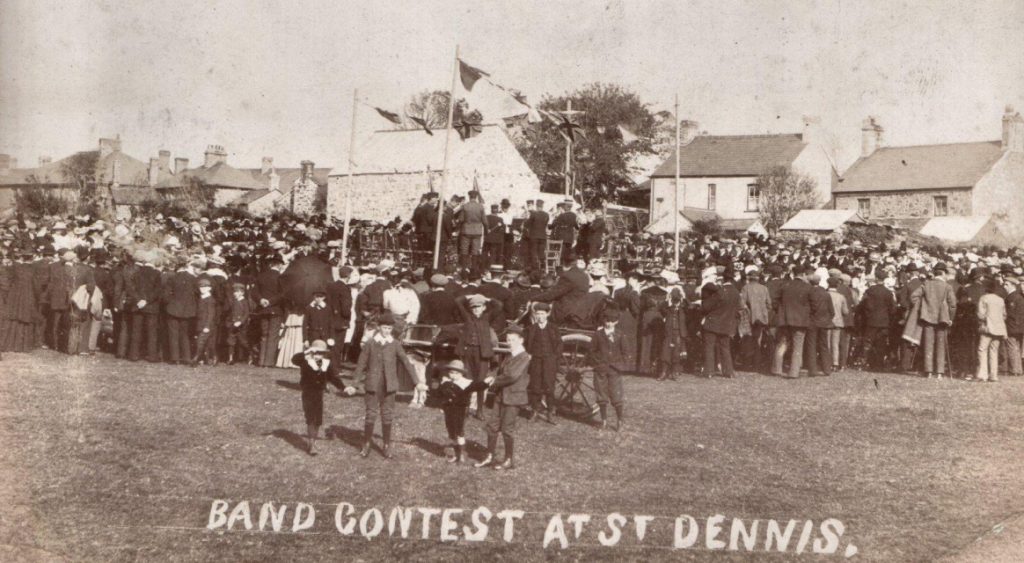
1st Pencoys, Four Lanes (Four Lanes Band)
August 1909
Adjudicator: Wm Short
Fraddon Band Contest
Carworgie, St Columb Road
(Fraddon Band)
16th September 1911
Adjudicator: Mr W Halstead
1st Cornwall Brass Band Association Contest
City Hall, Truro
24th March 1956
Adjudicator: Alfred Ashpole
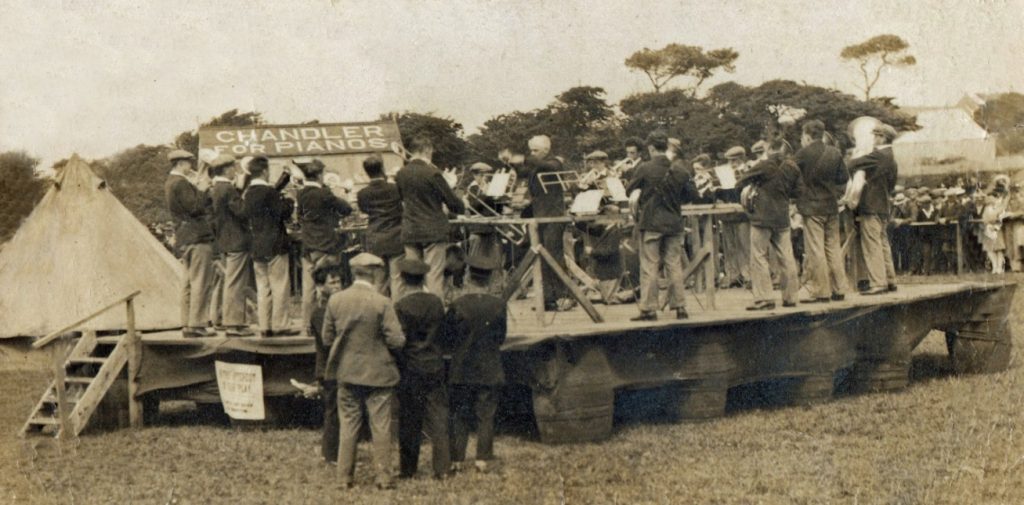
Of major importance was the annual Mid-Cornwall Bandsmen’s Festival at Stenalees and the Cornwall Brass Band Association Contest (CBBA) which was first held in 1956 and still takes place each year. The CBBA was formed in November 1955 with its competition restricted to member bands. Quite a few joined but the number taking part in the early contests was poor. Despite that, the West Briton headline was, “First Band Festival at Truro was a Great Success”. The initial event was held in the City Hall, Truro. It is difficult to find too many superlatives about the old hall; the toilets and changing rooms were in a terrible state and the new Hall for Cornwall is superior in every way and yet, when I think of this contest, my mind goes back to the City Hall, a venue of happy memories and associations.
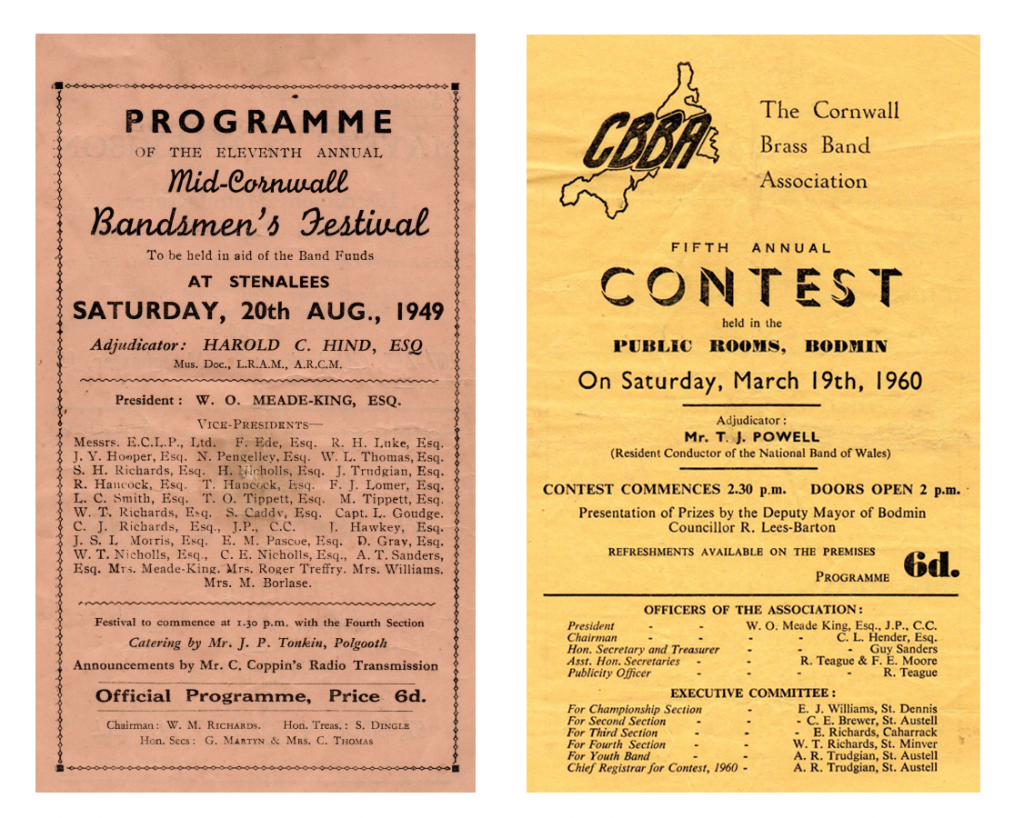
Brass bands thrived on competition and the standard of play gradually improved as bands practised hard to win the prizes. In the early days this might have been a brass instrument or a supply of meat – dead or alive. Now, it is more likely to be a monetary prize plus, of course, the coveted silverware. Contesting is a simple process of comparing your music making with others but, as with any other art forms, the prize winners are decided by a mixture of objectivity and subjectivity. The ‘men in the box’, as they are colourfully referred to, are the eminent musicians who have the onerous task of deciding who wins. They are secreted away so that they cannot tell which band is playing and so that justice can be seen to be done. After the last band has played they are ‘released’ and their deliberations revealed.
One of the oldest and most famous contests is our own West of England Bandsmen’s Festival, better known as ‘Bugle Contest’3. On this day the clay-mining village is transformed into a festival location and becomes a Mecca for bandsmen from Cornwall and beyond.It first appeared on the contest scene in 1912 and the following year it was granted Royal Patronage with the presentation of the Royal Trophy by the Prince of Wales.
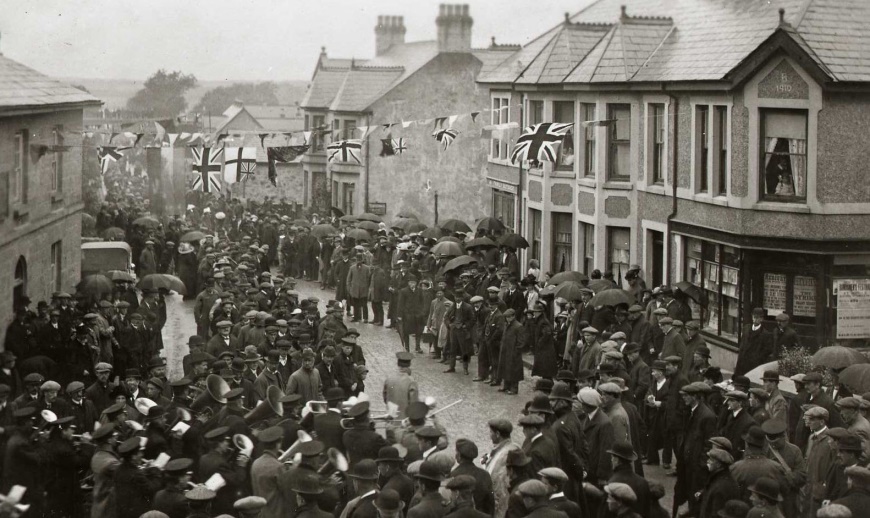
Despite its carnival atmosphere, the music produced by the competing bands is of the highest order and no one doubts the importance of this contest. As one supporter so succinctly put it, “Never mind the Nationals, who won at Bugle?”. Held in the open air, it has to be experienced first-hand and, although I played there on many occasions, I could not adequately describe its unique atmosphere nor could I convey the impact it had on this young bandsman. It is the only outdoor contest remaining from the early days of brass banding, a fact that does great credit to the organisers across the years.
The first contest was a resounding success. The Bodmin Guardian wrote, “There have been other band contests in the county before Saturday but the important festival which took place at Bugle was, by a long way, the most ambitious and triumphantly successful the Delectable Duchy has known”.
And so it has continued over the years: the march down to the contest field with expectations high, the thrill of competition, the tension as the results are announced and the march back up through the village with trophies held aloft. It has changed very little over the years; the crowds still gather to cheer on their favourites for there are few impartial spectators along the route.
Not all bands enter competitions and there are some which shun the contest stage, preferring to concentrate their efforts in providing music for local events. For most players, though, contesting has always been an important part of brass banding, the reason that they spend so many hours trying to perfect their art. It provides them with the opportunity to test their musical skills against others and, of course, to bring home that silverware.
Join us next month for more in the Music Kernow series. You can find the first article in the series here. You can also follow Cornish Story on Twitter and Facebook.
If you are interested in Cornish music, dance and art, you can find more relevant articles here, including the remainder of the Music Kernow series.
- Phillip Hunt is a BBC broadcaster and author of three articles in this series
- The chromatic scale is a musical scale with five pitches, each a semitone above or below its adjacent pitches
- Bugle is a village in mid-Cornwall about five miles north of St Austell on the A391 road. The village was established in the mid-nineteenth century following the construction of a turnpike road in 1836/7

Great.article Tony.